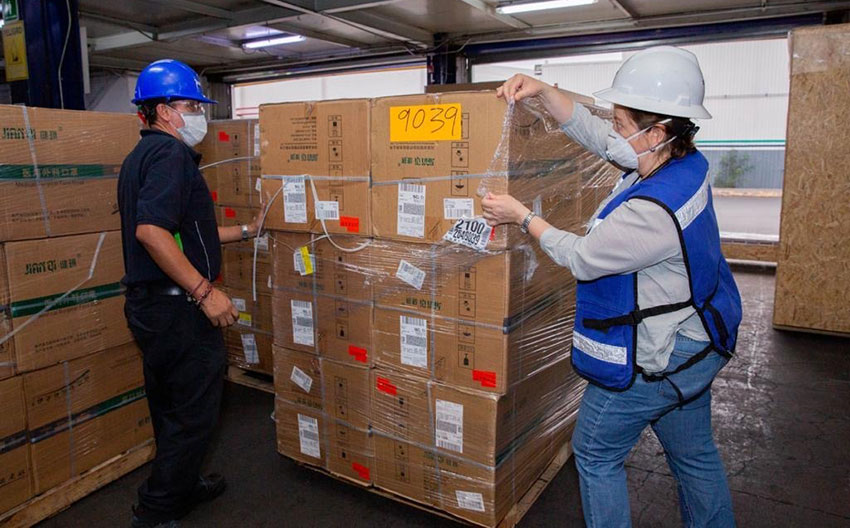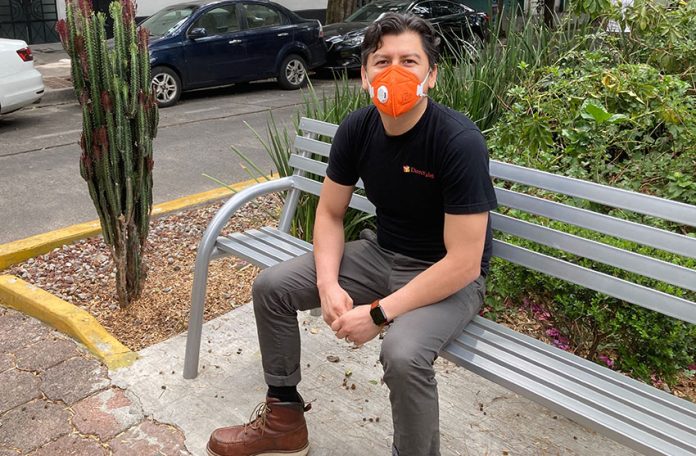It’s clear from the energy and detail in the stories he tells me that Eddie Mendoza has been cooped up for quite some time.
The head of Direct Relief Mexico has mostly spoken with his 11-month-old son, his wife and the doorman at his building in the last few months. All other talk has been diligent negotiating to get medical supplies to where they’re needed during the coronavirus pandemic.
So far the U.S.-based nonprofit dedicated to procuring medical supplies when disaster strikes has imported 350,000 surgical masks, 30,000 face masks and 10,000 goggles. The numbers on next week’s shopping list also run into the hundreds of thousands.
Eddie’s story truly is a paragon of how immigration should work in a system in which wealth inequality is an inevitable component. And it begins at the epicenter of the struggle for migrant workers’ rights in the United States.
Raised by migrant farmworkers in and around Delano, California — where labor organizers César Chávez and Dolores Huerta held their famous strikes that led to the founding of the United Farm Workers of America — Mendoza’s young life was a balance between working in the grape fields and school and extracurricular activities.
“My dad ended up finding us a little house, a little shack with one room, not even a kitchen, a radio console for a table and a bathroom,” he says with evident nostalgia. There were holes in the floor and no heat in the winter, but the five of them made lasting memories in that house.
He tells me the tragicomic anecdote of how his brother came to be nicknamed “El Mofles” (Mufflers) for the time their dad accidentally ran him over in the family car, hitting him in the head with the muffler (he survived, obviously). He puts me in that car with his dad early in the morning before the fog has cleared, on the way to pick grapes. Crimson, Thompson, seedless, red globe. He remembers all the names, remembers how to prune and graft.
He speaks fondly of the rich Mexican culture that found solidarity in the southern California migrant communities located in places with names like Linnell Camp and Earlimart.
And it’s this love for his Mexican culture, food and people that ultimately led him to where he is today: at the helm of Direct Relief’s efforts to get safe medical supplies and medications to the hospitals that need them most in order to fight Covid-19.
He actually led the entire initiative to bring the U.S. disaster relief nonprofit south of the border in 2014, after five years of liaising with governments, nonprofits, businesses and hospitals. Memories of road trips back to Zacatecas growing up led him to move to Mexico City to run the operation from there in 2016.
On his agenda next week: purchasing 285,000 surgical masks, 15,750 N95 masks, 610 boxes of gloves, 10,000 face shields and 80,000 surgical gowns. Not an easy task in a market rife with faulty products and money laundering schemes.

“During Covid, what we’ve been doing is validating vendors. There’s been a lack of product available in the market, and because of that there’s a lot of garbage product,” he said.
Direct Relief Mexico’s three-person team (including him) has to verify products and vendors all the way down the supply chain in order to obtain effective equipment.
“There are a lot of doctors trying to do good, but they don’t have the tools. You wouldn’t send a farmer out into the field without a hoe,” he says.
The other major disaster his organization has seen since coming to Mexico was the pair of earthquakes in September 2017, one of which left Juchitán, Oaxaca, in ruins. However, despite the magnitude of the damage, those two quakes killed 468 and injured over 6,300. According to the latest data, Covid-19 has killed over 9,000 people and infected over 84,000 in Mexico so far.
Direct Relief has also worked to get direly needed cancer medications during a protracted shortage that has gotten so bad that nine parents of kids with cancer began a hunger strike on Wednesday to demand the government finally fix the problem.
“Thank you for helping me get my medications,” says a young, smiling, noticeably healthy boy in a video Eddie shows me from his WhatsApp account. “I’ve finished my treatment. Thank you for everything.”
As the coronavirus pandemic lays bare those parts of the institutions of both countries rendered ineffective by everything from bureaucracy to political infighting to bruised egos, Eddie’s leadership during the crisis is a shining example of how the public and private sectors could behave and interact in order to get better results.
His approach is simple, but effective. Friendly, but professional. “Working in conjunction to create mutual strengths,” he describes it. And being detailed enough to make everything “stupid proof” so that the right supplies get to the right hospitals at the right time.
And the proof is in the hundreds of thousands of units of personal protective equipment his organization has procured for doctors and nurses in hospitals so understocked that staff have gone on strike to demand they be properly equipped.
Eddie emails me the following day to send photos and purchasing figures and says thank you for the opportunity for a regular conversation. I too am grateful for the chance to sit in the shade and tell stories from the past and muse on what we’ll do when we’ve returned to whatever normal is going to be.
All of us could take a cue from Eddie when it comes to how we interact with each other again. If we manage all of our relationships, from the personal to the inter-institutional, with good intentions and the ultimate goal of mutual benefit, we just might see large-scale positive results proportional to what he has achieved during the coronavirus pandemic.
“I want to show Mexico that if you trust, you can accomplish big things.”
Mexico News Daily
